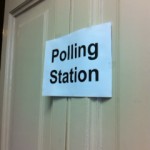9th May 2013 London, UK
At the ballot box
My first visit to a polling station was not to vote, but as a poll clerk. From 6am until 10pm I sat in a draughty hall in Harrow, north London checking that the voters were on the electoral register, validating their ballot paper with a special machine and handing it to them so they could go into a polling booth and make their choice in secret.
As the day wore on, I noticed that some families arrived together and the older man made sure that everyone in the family knew which candidate they should put their cross against before they went into their individual polling booths. I turned horrified to my fellow polling clerk, asking whether that was illegal. He assured me it was legal, as each voter cast their vote in secret and we were keeping a close eye on what happened between polling booth and ballot box so that the vote remained secret. And, he added, while the husband might tell his wife how to vote, the wife was making all the decisions in the family that really mattered.
No doubt this poll clerk thought me young and naïve. I probably was. But I’m still shocked by his attitude. In our latest Democracy in Action video, Councillor Zarina Khalid from Harrow challenges one of her constituents who says she doesn’t vote because she doesn’t trust any of the parties. They promise but don’t deliver on their promises. Zarina replies by pointing that the party she votes for will have a big say over what happens in the local area. How can one of those voters I met in Harrow make decisions for her family that really matter if she can’t have a say over education, the economy and the many more issues which are up for debate during an election campaign.
My Granny has never voted. At a quick count, she has had around fourteen opportunities to do so in elections for the national government, and many more if you include local elections. She said she didn’t want to be blamed for whatever the government of the day decided to do. We argued with her that it did the opposite, but she wouldn’t vote.
Not voting can seem the easier option. We don’t have to try to imagine the future and how we want decisions to be taken about big, complex issues facing the future of our country. We don’t have to vote for someone who we may not agree with 100% and who may then have to make compromises on issues we care deeply about. As Councillor Zarina Khalid says “lots of people out there think it’s just me, I don’t matter, but it has a cumulative effect. It does matter.” She quotes her favourite poem “with faith, disciplines and selfless attention to duty, there is nothing that one cannot achieve.”

